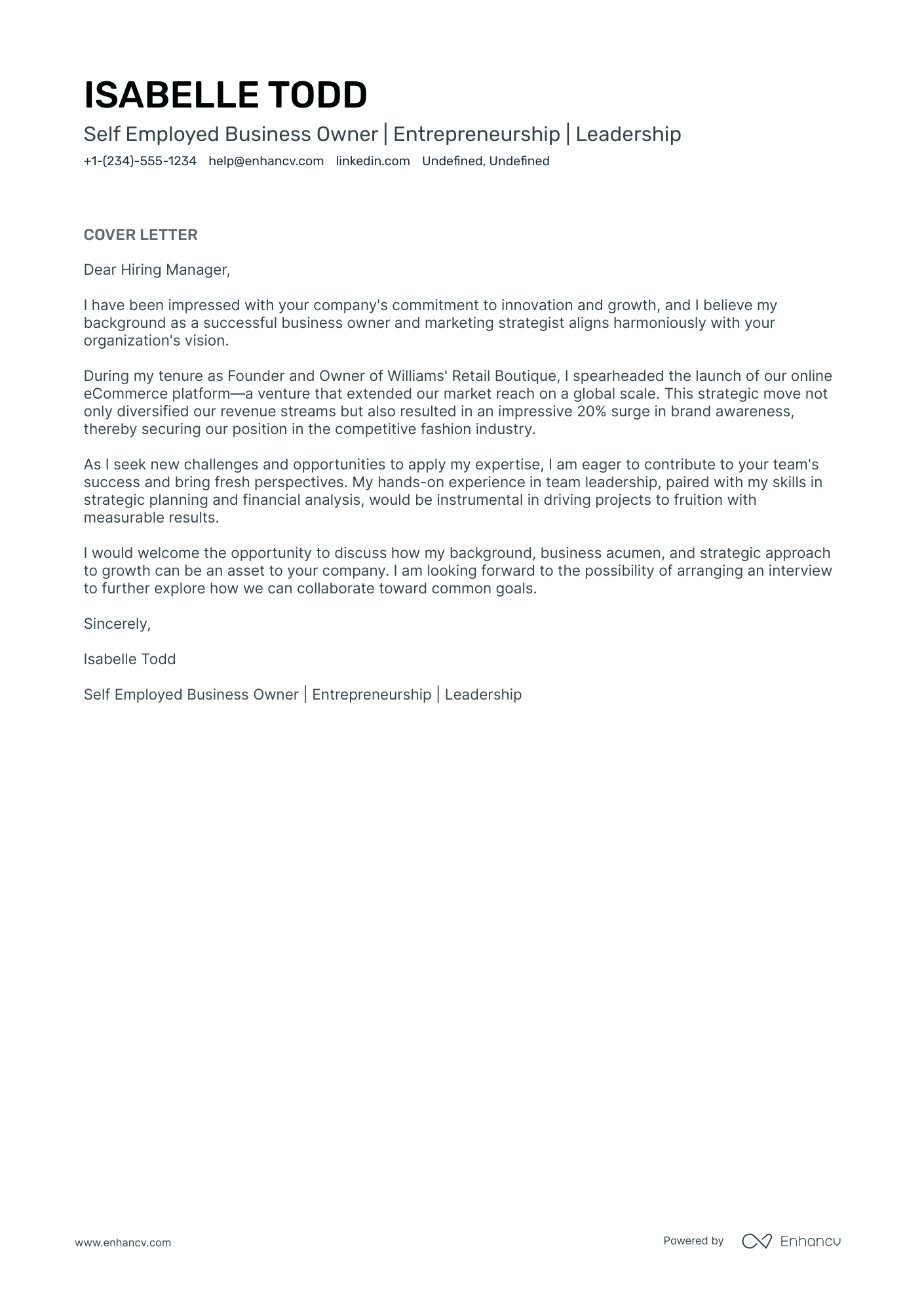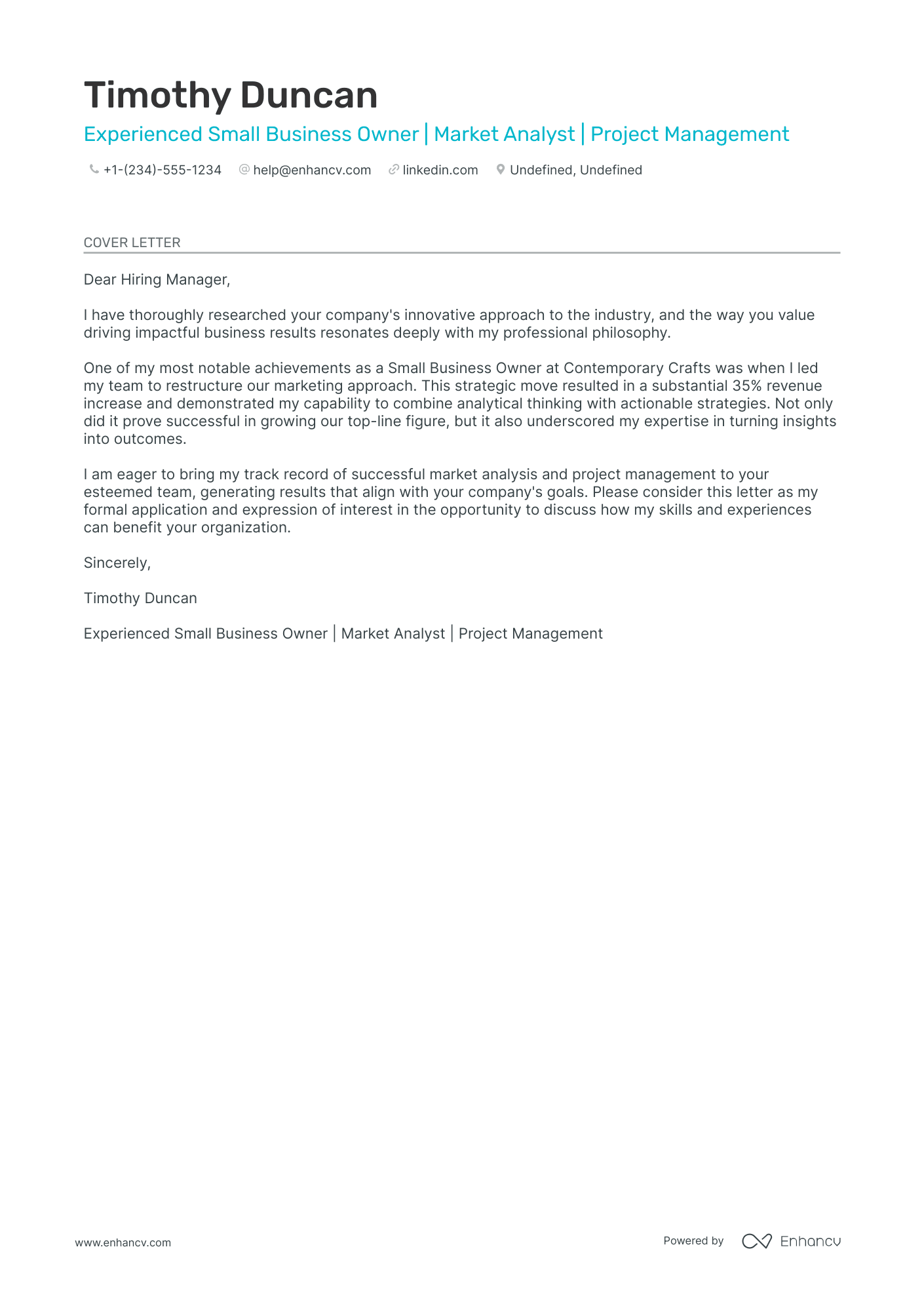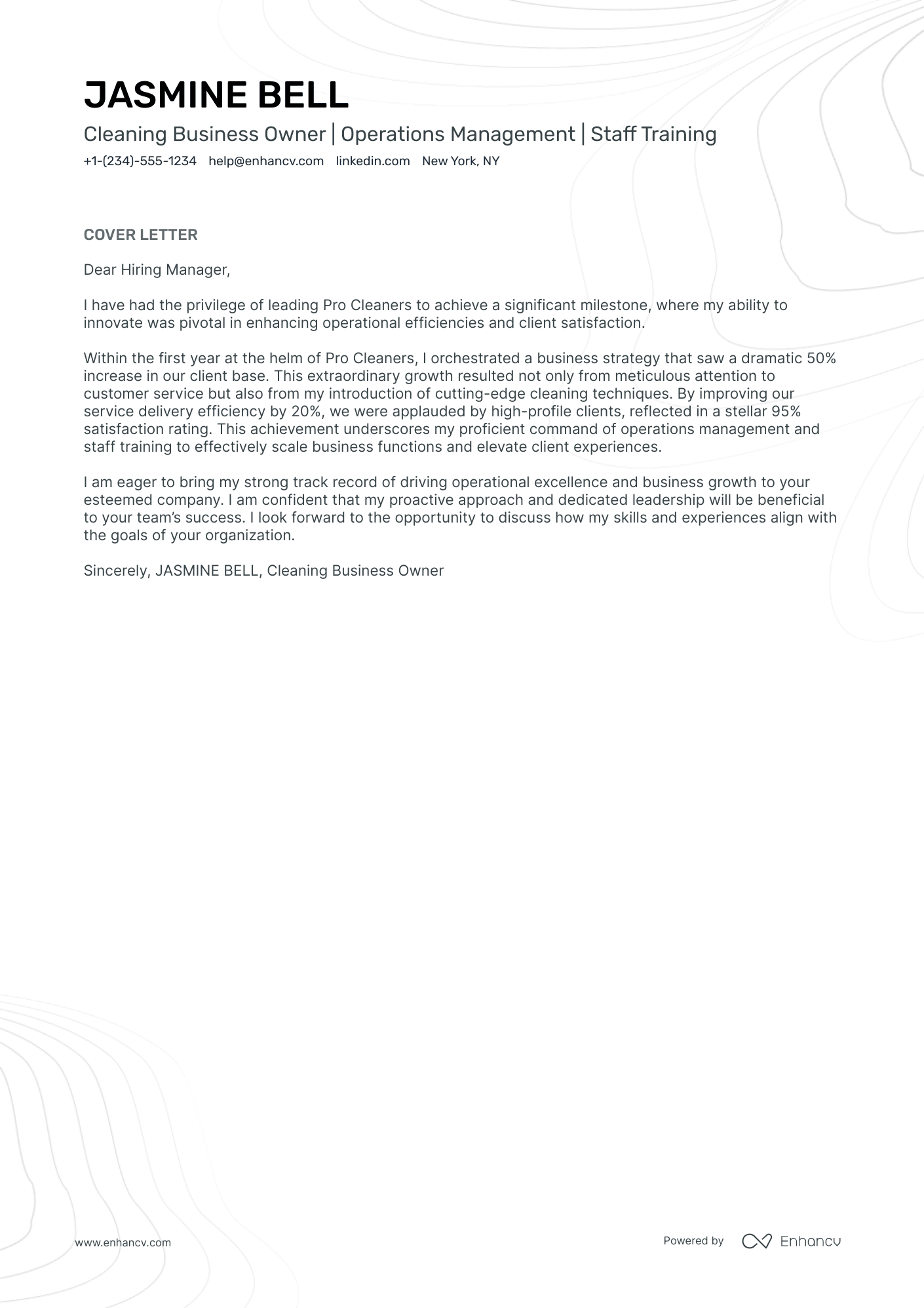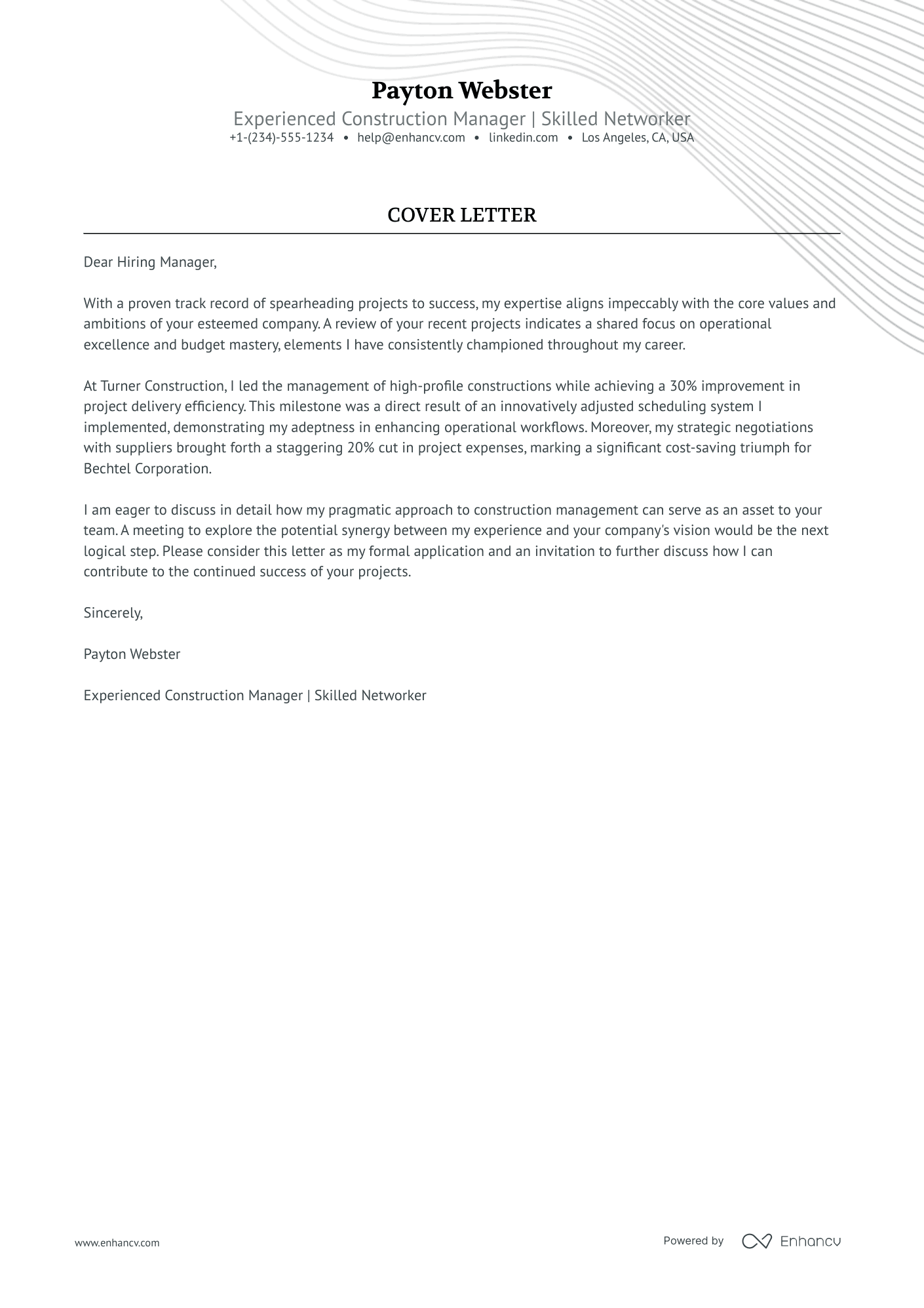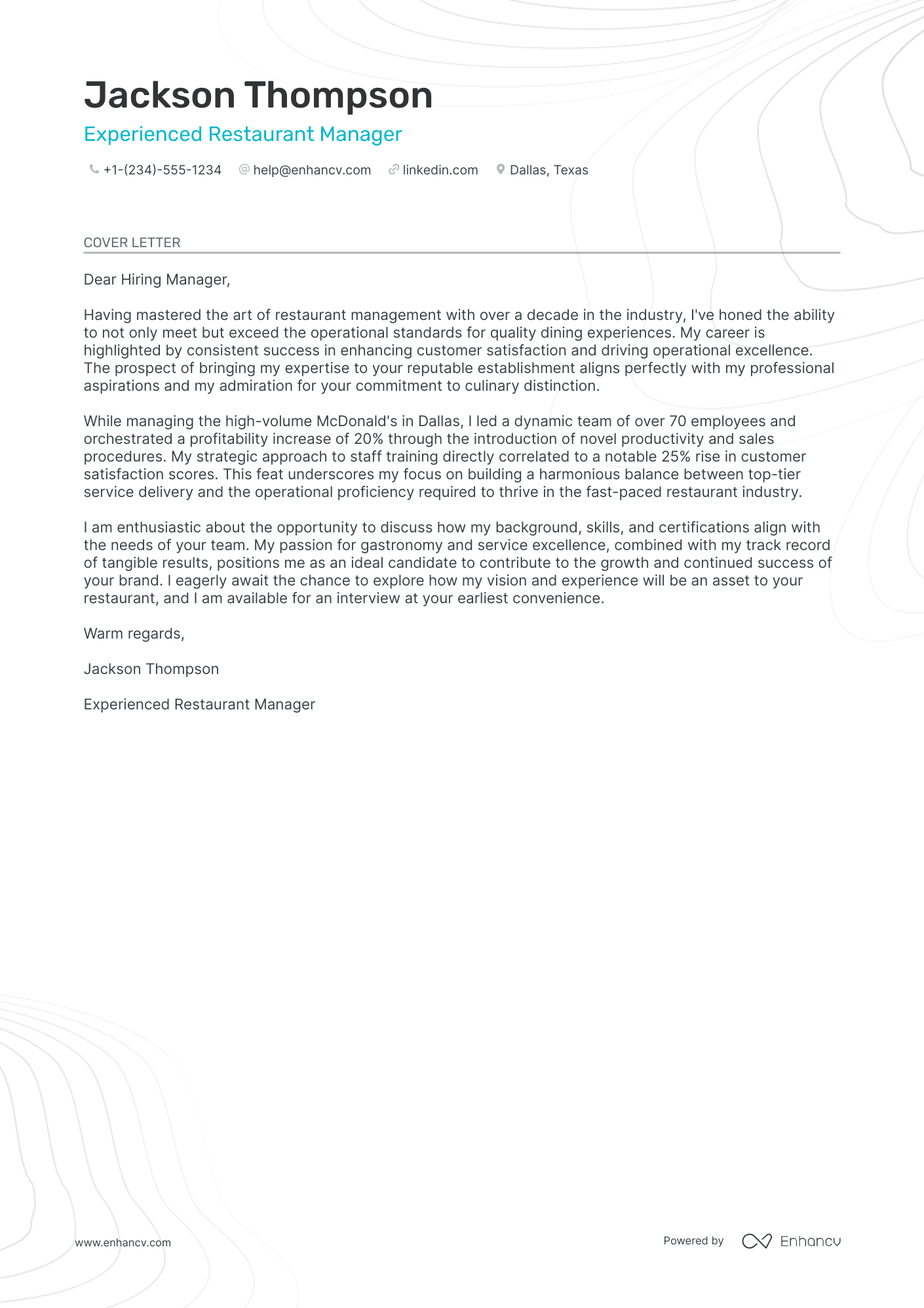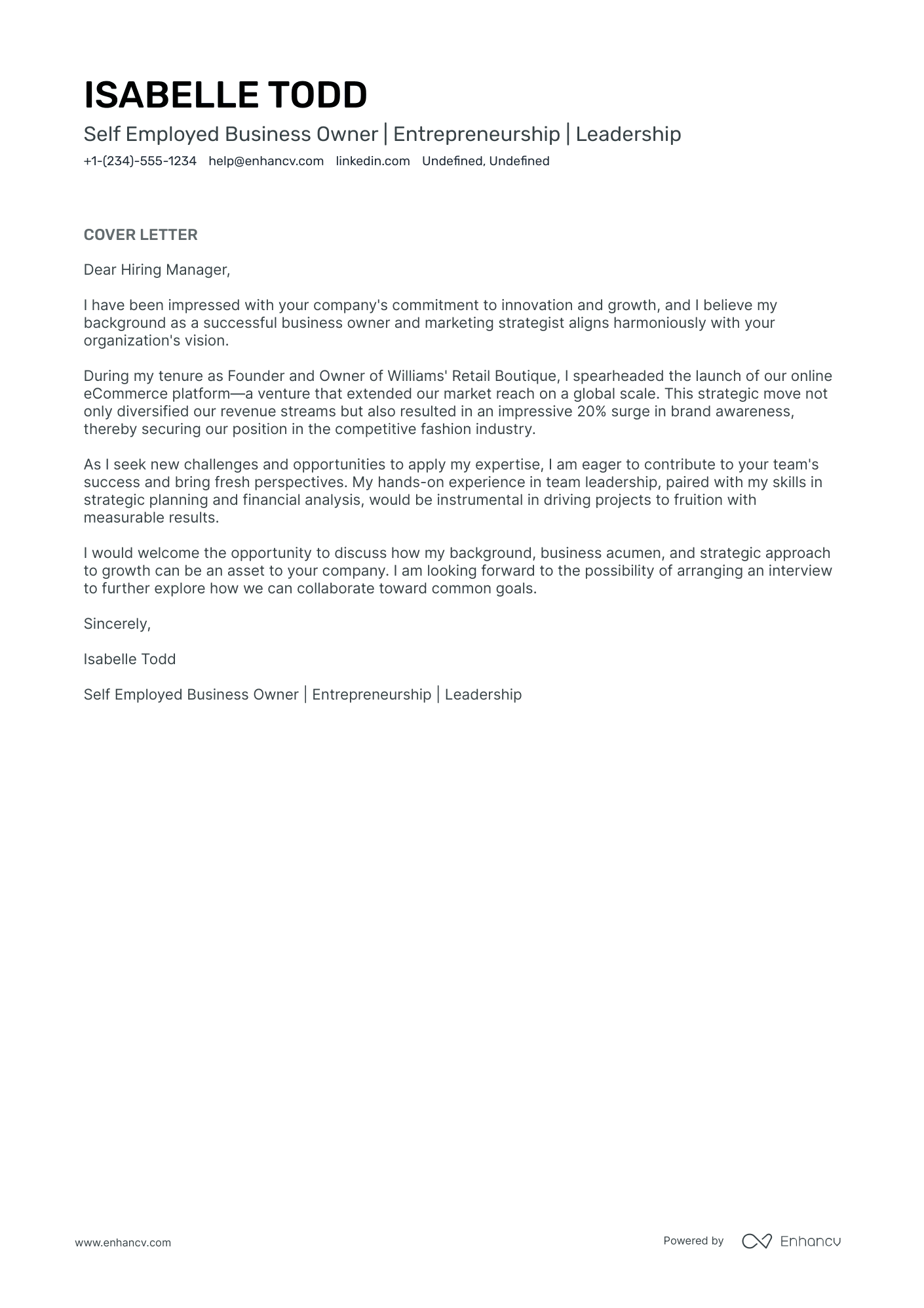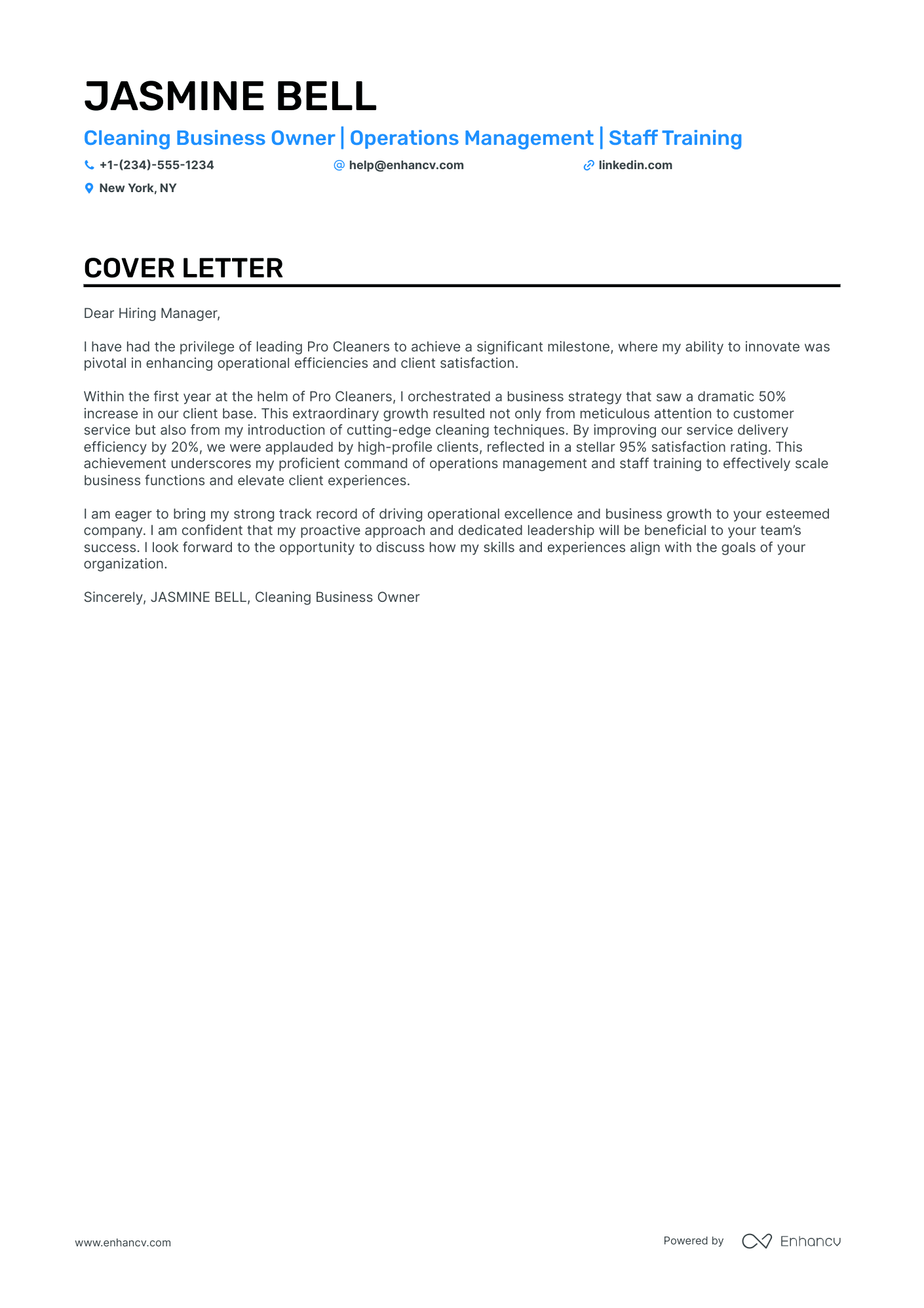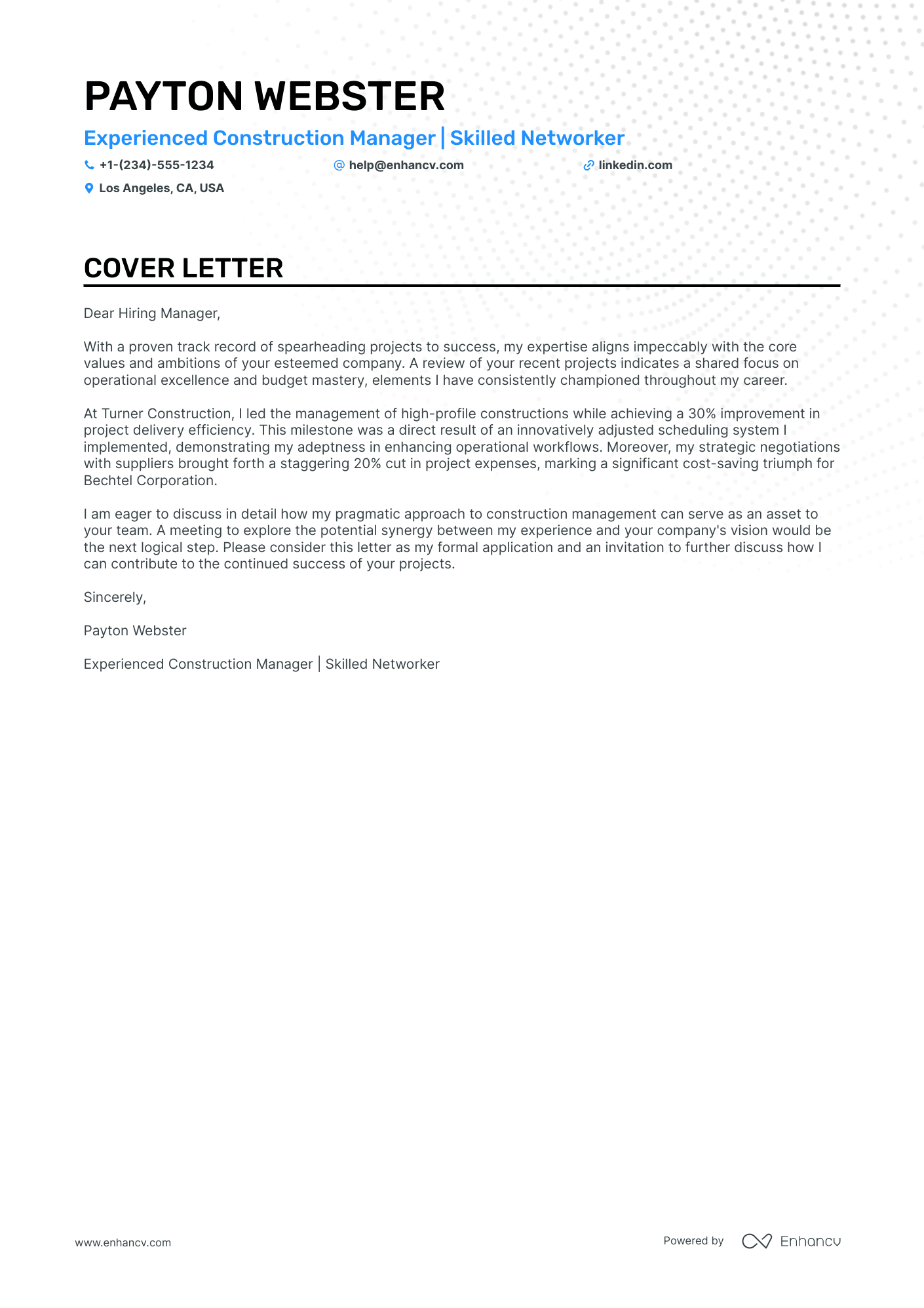You're poised to hit 'submit' on that job application when you realize a business owner cover letter is required. It's here you face the common challenge: crafting a compelling narrative that doesn't just echo your resume. Your mission? To spotlight one major triumph, weaving a tale that holds attention without the tired clichés. Striking the delicate balance between formal and fresh, all while keeping it to one page, can seem daunting. Let’s conquer that together.
- Write a business owner cover letter that helps you stand out (and get the job);
- Understand how to start and end your business owner cover letter with the appropriate greeting;
- What to include in the body of your business owner cover letter to put your best foot forward;
- Your most important achievements - how to present them as part of your business owner cover letter.
And if you want to make your life even easier, simply drag and drop your business owner resume into Enhancv's AI cover letter generator, and it will write your cover letter for you in just a few moments.
If the business owner isn't exactly the one you're looking for we have a plethora of cover letter examples for jobs like this one:
- Business Owner resume guide and example
- Strategic Account Manager cover letter example
- Digital Director cover letter example
- Demand Planning Manager cover letter example
- Category Manager cover letter example
- Innovation Specialist cover letter example
- Business Operations Manager cover letter example
- Fedex Operations Manager cover letter example
- Casino Manager cover letter example
- Business Development Consultant cover letter example
- Business Manager cover letter example
Drop your resume here or choose a file.
PDF & DOCX only. Max 2MB file size.
Business owner cover letter example
Hazel Clark
Charlotte, North Carolina
+1-(234)-555-1234
help@enhancv.com
- When applying for a financial role, it's crucial to emphasize relevant experience, such as the strategic financial planning and tax optimization skills mentioned in the cover letter.
- Quantifiable achievements, such as reducing taxable income for clients or enhancing department revenue, demonstrate the candidate's practical impact and success in previous roles.
- It's beneficial to align personal professional philosophy with the organization's mission, which in this case includes a focus on innovation and integrity in financial operations.
- Expressing eagerness to contribute to the company's success and an understanding of specific regulations (like FICA) shows the candidate's proactive approach and readiness to be an asset from the start.
The format of your business owner cover letter: structure, fonts, margins, and more
Your business owner cover letter should include a header (with your name, position, and date); a greeting and introductory paragraph; a body and closing paragraphs; and an optional signature.
Remember that you're writing your business owner cover letter for recruiters - as the Applicant Tracker System won't scan this content.
Here are a few more tips and tricks to keep in mind when formatting your business owner cover letter:
- Use the same font in your business owner cover letter and resume. We recommend modern fonts, e.g. Lato and Rubik, to help you stand out, instead of the stereotypical Arial and Times New Roman.
- Each paragraph should have single spacing, which is already set up for you in our cover letter templates.
- Our cover letter builder follows industry standards for your business owner cover letter formatting - with a one-inch margin, surrounding your content.
- Always export your business owner cover letter in PDF to ensure the image or text quality stays the same and your writing isn't moved about.
Writing cover letters just got easier. Use our free cover letter generator to create yours instantly.
The top sections on a business owner cover letter
- Header: Include your personal contact information, business details, and the date, setting a professional tone and establishing your identity as a business owner.
- Greeting: Address the recruiter or hiring manager by name to personalize the cover letter and demonstrate that you have researched the company.
- Introduction: Briefly introduce yourself as a business owner, highlighting your entrepreneurial mindset and how it relates to the new role you are pursuing.
- Professional Achievements: Detail specific business milestones or successes you've accomplished, illustrating your capability to drive results and manage a business effectively.
- Closing: Express your enthusiasm for the potential partnership or position, summarizing how your business experience aligns with the company's goals, and include a call to action for a meeting or discussion.
Key qualities recruiters search for in a candidate’s cover letter
- Entrepreneurial spirit: Demonstrates initiative, the ability to spot opportunities and the drive to turn ideas into successful ventures.
- Financial acumen: Reveals understanding of financial management, budgeting and cost control in running a business successfully.
- Leadership and management skills: Essential for directing teams, making decisions, and overseeing business operations effectively.
- Strategic thinking: Shows the ability to formulate effective business strategies and long-term planning to ensure the business adapts and thrives.
- Problem-solving abilities: Critical in business for overcoming challenges, resolving issues and ensuring continuous operation and growth.
- Experience in business development: Indicates a proven track record in growing a business, expanding market reach and increasing profitability.
How to greet recruiters in your business owner cover letter salutation
As the saying goes, "You never get a second chance to make a first impression."
Write your business owner cover letter salutation to be more personalized to the actual hiring manager, who is set to assess your profile by:
- greeting them on a first-name basis, if you have previously communicated with them (e.g. "Dear Sam,");
- using their last name, if you have more formal communication or haven't spoken to them (e.g. "Dear Mr. Harrows" or "Dear Ms. Marshall");
- writing "Dear HR Team" or "Dear Hiring Manager", if you have no clue about who's recruiting for the role.
Search on LinkedIn, Google, or the company website to find information as to the recruiter's name.
In any case, avoid the impersonal "Dear Sir or Madam".
List of salutations you can use
- Dear [Employer's Name],
- Dear [Mr./Ms./Dr.] [Last Name],
- Dear Hiring Manager,
- Dear Search Committee,
- Dear [Department Name] Team,
- Esteemed [Job Title] Selection Committee,
Using your business owner cover letter intro to show your dedication
We know just how difficult it is to start writing your business owner cover letter introduction.
There are so many great qualities you have as a professional, which one should you choose?
How about writing up to two sentences about your passion and commitment to the work you do or are set to do?
Try to describe exactly what you enjoy about the potential role.
A positive attitude from the get-go will help you stand out as a motivated business owner professional.
How to write an achievement-focused business owner cover letter body
We've got the intro and greeting covered. Now, comes the most definitive part of your business owner cover letter - the body.
In the next three to six paragraphs, you'd have to answer why should recruiters hire you.
What better way to do this than by storytelling?
And, no, you don't need a "Once upon a time" or "I started from the bottom and made it to the top" career-climbing format to tell a compelling narrative.
Instead, select up to three most relevant skills for the job and look back on your resume.
Find an achievement, that you're proud of, which has taught you these three job-crucial skills.
Quantify your accomplishment, using metrics, and be succinct in the way you describe it.
The ultimate aim would be to show recruiters how this particular success has built up your experience to become an invaluable candidate.
Two ideas on how to end the final paragraph of your business owner cover letter
Closing your business owner cover letter, you want to leave a memorable impression on recruiters, that you're a responsible professional.
End your cover letter with how you envision your growth, as part of the company. Make realistic promises on what you plan to achieve, potentially, in the next six months to a year.
Before your signature, you could also signal hiring managers that you're available for the next steps. Or, a follow-up call, during which you could further clarify your experience or professional value.
No experience business owner cover letter: making the most out of your profile
Candidates who happen to have no professional experience use their business owner cover letter to stand out.
Instead of focusing on a professional achievement, aim to quantify all the relevant, transferrable skills from your life experience.
Once again, the best practice to do so would be to select an accomplishment - from your whole career history.
Another option would be to plan out your career goals and objectives: how do you see yourself growing, as a professional, in the next five years, thanks to this opportunity?
Be precise and concise about your dreams, and align them with the company vision.
Key takeaways
Turning your business owner cover letter into a success is all about staying authentic to yourself and relevant to the job:
- Be creative with your business owner cover letter introduction by stating something you enjoy about the company (that is genuine) or about your skill set (to get the recruiters' interested);
- Use single spacing and have a one-inch margin wrapping all around the content of your business owner cover letter;
- Select just one past achievement from your career or life to tell a story of how you've obtained job-crucial skills and how they'd be beneficial to the role;
- The finishing paragraph of your business owner cover letter doesn't necessarily have to be a signature but could be a promise of what you plan to achieve in the role;
- Instead of focusing on your lack of experience, spotlight your transferable skills, one relevant achievement, and career dreams.
Business Owner cover letter examples
By Role
